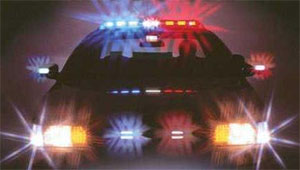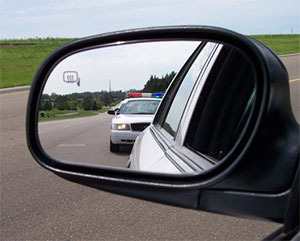Hoover Dam Police Department - Safeguarding a National Icon
What to Do When Stopped by a Police Officer

There are many reasons why a Hoover Dam police officer may ask you to stop your vehicle. Whatever the reason, the officer needs your cooperation:
- The officer may want to warn you about a potentially dangerous situation
- You may have committed a traffic violation
- The vehicle you are driving may have an equipment violation
- Your vehicle may match the description of one used in a criminal act
- The officer may think you are in trouble and need help.
If you are stopped while driving, you may feel confused, anxious, or even angry. These are natural feelings, but remember, vehicle traffic stops can also be stressful and dangerous for the police officer as well. Also, quite often a second police officer may assist with a vehicle traffic stop; this is for the protection of the officers, not because you are a "criminal".
Statistics show each year a significant number of law enforcement officers are killed or seriously injured while conducting routine traffic stops.
With these facts in mind, there are several things you can do to lessen the uneasiness of the overall experience:
- When you see overhead emergency lights and/or hear a siren, remain calm, slow down, and pull over in a safe location off the roadway. Or, if it is not safe to stop in the roadway, pull off into a nearby parking lot.
- If there is any question whether the person stopping you is, in fact, a police officer, keep your doors locked and window down only enough to hear and communicate clearly. If the officer is in plain clothes, ask to have a uniformed officer respond. If for any reason, you do not feel safe, turn on your emergency flashers and drive the posted speed limit to a well-populated area or nearest police station. You can also call 9-1-1 from your cellular phone.
- At night especially, bright spotlights are used for the safety of all persons involved. They are not meant to intimidate or embarrass you.
- Do not exit the vehicle unless asked to do so. This is for safety reasons.
- Keep your hands on the steering wheel so the officer can see them.
- If you're stopped at night, it's prudent to turn on your interior light.
- Inform the officer of any weapons in your vehicle and their location. Do not reach or point to the location.
- Avoid any sudden movements, especially toward the floorboard, rear seat or passenger side of the vehicle.
- Comply with the officer's request to see your driver's license, proof of insurance and vehicle registration.
- If your documents are out of reach, tell the officer where they are before you reach for them.
 If there are passengers in your vehicle, encourage them to remain quiet and cooperate with instructions. You, as the operator, are solely responsible for your vehicle and its occupants.
If there are passengers in your vehicle, encourage them to remain quiet and cooperate with instructions. You, as the operator, are solely responsible for your vehicle and its occupants.
- Avoid becoming argumentative. Arguing will not change an officer's mind regarding a citation. If you contest the violation, you will have an opportunity to address the matter in court.
- Answer all questions truthfully. It is a violation of Federal Law 18 USC 1001 to provide written or verbal false statements to the government.
- The officer may issue you a ticket. If you feel the reason is vague or unclear, politely ask the officer for details.
- If asked to sign a citation, do so. This is NOT an admission of guilt; it merely shows you received the citation.
- You have the right to politely deny a request by a police officer to search your car; however, if probable cause is present, the officer has the right to search your vehicle without your consent.
- Understand that each situation is unique and police officers must alter their responses to fit the circumstances.
- Generally, a police officer will provide his/her name upon request, inform a person of the reason for being stopped, and only arrest a person for a crime committed in the officer's presence, or when the officer has probable cause to believe a person has already committed a crime.
Remember, traffic stops are a very important law enforcement function, and help maintain safety for everyone. Careful consideration of these tips can provide a less stressful and safer experience for you, your vehicle occupants and our officers.
Return to Hoover Dam Police Homepage

